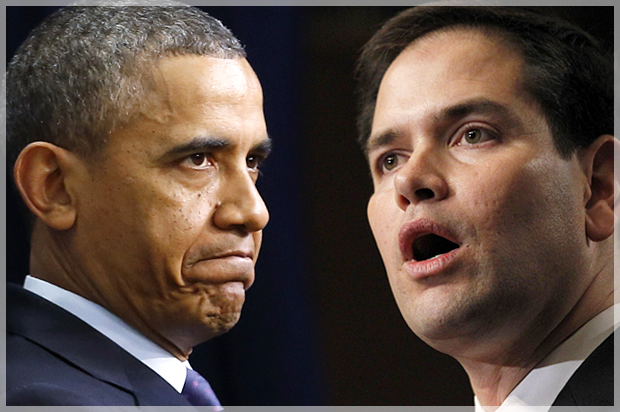With two young, first-term senators from minority backgrounds running for the Republican presidential nomination, it was inevitable that they would face comparisons to President Obama and his own audacious political rise. Most politicians would happily allow themselves to be lumped in with a president who defied odds and expectations and comfortably won two terms in the White House, but for Marco Rubio and Ted Cruz, there is a certain amount of danger in those comparisons. The Republican Party and the conservative movement have spent the better part of the past eight years loudly complaining about what happens when you elect an “inexperienced,” “untested,” and “rookie” president who wasn’t “ready on day one.” The party’s voters have been taught to believe that first-term senators make bad presidents.
Both Cruz and Rubio have tried to defuse these comparisons. Earlier this year, Cruz defiantly insisted that he’s spent his short Senate career “leading the fight on conservative principles,” unlike Sen. Obama, who was a non-entity who “did not engage in a whole lot of issues of consequence.” The argument didn’t make a ton of sense, given that first-term senators are all backbenchers and Cruz’s “leadership” consisted mainly of grandstanding and obstructionism, but he nonetheless insisted that his “experience” was infinitely superior to Obama’s at the time.
Now Rubio is fielding questions from voters who want to know what makes him so different from the last first-term senator elected president. And, like Cruz, Rubio is trying to make the case that he has far more experience than Obama did. Here’s NBC News’ report on Rubio’s campaign swing through South Carolina:
One question hung over the senator all day — the question of his youth and inexperience, which echo President Obama’s at the time he was elected. At both town halls on Saturday, Rubio was asked by a crowd member to explain how he’d do better than Obama, with a similar amount of experience, but Rubio dispatched the question with ease. In Anderson, he argued he, unlike Obama, had done something in office, pointing to his effort to undermine Obamacare by effectively defunding the law’s risk corridors.
NBC’s insistence that he expertly “dispatched” the issue notwithstanding, this is a pretty bad answer from Rubio. First of all, Obama did accomplish some stuff as a senator – he worked on legislation preventing the proliferation of WMDs that was incorporated into larger bill that passed into law, and he worked with Republican colleagues on oversight of Hurricane Katrina relief funds. It was small-bore stuff, but again, first-term senators aren’t really expected to do big stuff.
That brings us to another reason why Rubio’s argument is so bad. Rubio differs from Cruz and Obama in that he actually was called on to work on a far-reaching and important piece of legislation: the 2013 Gang of Eight comprehensive immigration reform bill. But he can’t really bring that up as proof of his experience and accomplishments because it’s politically radioactive to conservative voters. There’s also the fact that, as a member of the Gang of Eight, Rubio was apparently a less-than-stellar negotiator who didn’t recognize when he had leverage and made concessions where they weren’t necessary (something that might not have happened if he’d had more, ahem, experience).
Instead of citing this real, but politically fraught, accomplishment, Rubio falls back on this notion that he secured a crippling blow against the Affordable Care Act by “defunding the law’s risk corridors.” The problems with this argument stack high, but the most glaring issue is that Rubio didn’t have much of anything to do with the legislative strategy that led to the funding shortfall in Obamacare’s risk corridors. Rubio wrote some letters and issued a few press releases, but all the legislative wrangling was done by other, more senior lawmakers. He’s taking all the credit for it despite not having done the work.
So, ironically, while Rubio does have a legitimate claim to experience with the immigration bill, he can’t bring it up because it will hurt him politically. Instead he poaches the accomplishments of others to convince wary conservative voters that he’s more “experienced” than the last first-term senator who was elected president.


